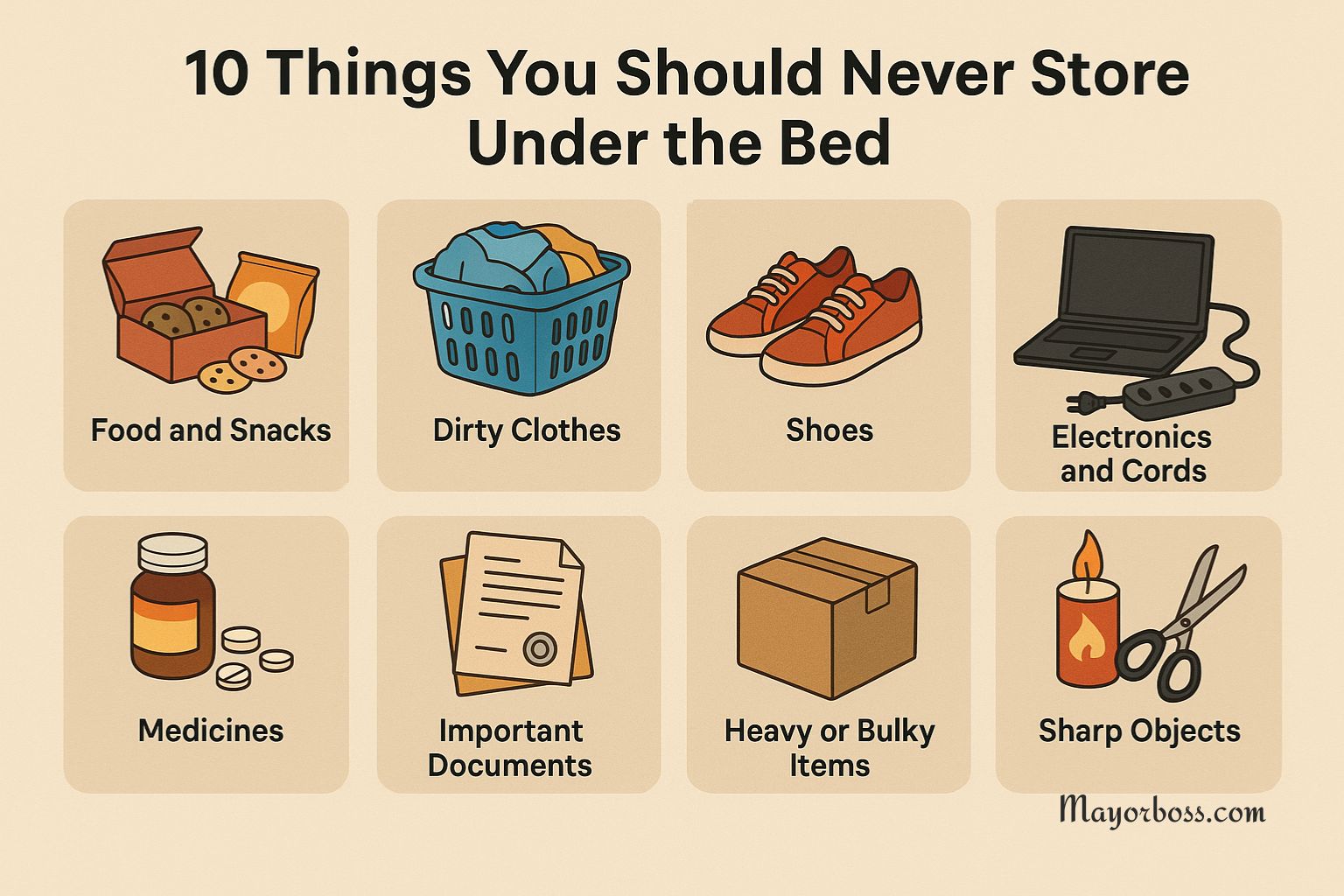10 Things You Should Never Store Under the Bed
Storing items under the bed can save space, but some things should always be kept elsewhere. Avoid putting food, dirty clothes, shoes, electronics, medicines, cash, important papers, sharp objects, heavy items, and flammable materials under your bed. Doing so can protect your health, safety, and peace of mind.

Maximizing every inch of space in your home is smart, especially if you live in a small apartment or have a lot of belongings. Storing things under the bed might seem like the perfect solution. However, not everything belongs there. Some items can attract pests, cause health issues, or even create a safety hazard. Let’s look at ten things you should never keep under your bed—and why you’re better off finding another spot for them.
1. Food and Snacks
It’s tempting to tuck away a box of cookies or a bag of chips within easy reach. But storing food under the bed is an open invitation for ants, cockroaches, mice, and other pests. Crumbs and spills can attract insects and rodents quickly. Even sealed packages can be chewed through. Over time, food can spoil and create unpleasant smells. For your health and to avoid an infestation, keep all food in the kitchen or pantry.
2. Dirty Clothes
It’s easy to toss laundry under the bed, especially when you’re in a hurry. However, dirty clothes can grow mold and mildew if they stay damp. Sweat and body oils can also create musty odors. On top of that, dirty laundry can attract dust mites and even bugs. For better hygiene, always keep a laundry basket in your room and wash clothes regularly.
3. Shoes
You might think the space under your bed is perfect for your shoe collection. However, shoes carry dirt, germs, and sometimes moisture. When stored in a closed, dark space, shoes can develop odors and even mold. In some cultures, shoes are considered to bring negative energy if kept under the bed. Use a shoe rack or store shoes in a well-ventilated closet instead.
4. Electronics and Cords
Many people slide old laptops, power strips, or tangled cords under the bed to get them out of sight. But electronics generate heat, and the lack of airflow under the bed can be dangerous. Dust builds up quickly and can damage devices or create a fire risk. Also, loose cords may trip you or get damaged. Store electronics in a safe, clean area with proper ventilation.
5. Medicines
It might seem handy to keep medications close by, but the space under the bed is not the right place. Medicines need to be stored in a cool, dry place. Under the bed, temperatures and humidity can fluctuate, causing medicines to lose their effectiveness. Children or pets might also get into them. Always store medicines in a secure cabinet, away from heat and moisture.
6. Important Documents
Birth certificates, passports, financial papers, and other important documents can easily be forgotten under the bed. Paper attracts dust and may become damaged by moisture or pests. In the event of a fire, flood, or even a quick cleaning spree, you might lose track of these items. For peace of mind, use a fireproof lockbox or a secure filing system.
7. Cash and Valuables
Some people believe hiding cash or jewelry under the bed will keep it safe from burglars. In reality, this is one of the first places thieves look. Valuables can also be damaged by dust or humidity. Use a safe or a secure, hidden place that is not so obvious.
8. Heavy or Bulky Items
It can be tempting to shove heavy boxes or large items under the bed to clear up space. However, heavy items can damage the bed frame or make it difficult to clean under the bed. In emergencies, heavy items could shift or fall, creating a hazard. Instead, store large items in a closet or garage.
9. Flammable Items
Never keep anything flammable—like extra batteries, candles, aerosol cans, or cleaning supplies—under your bed. In the rare event of a fire, these items could worsen the situation. They are also dangerous if children or pets find them. Store flammable materials in a safe, well-ventilated area away from sleeping spaces.
10. Sharp Objects
Storing scissors, tools, or anything with a sharp edge under your bed is risky. Reaching under the bed without looking can lead to cuts or injuries. If you have kids, sharp objects should be kept well out of reach and in a locked toolbox or drawer.
Final Thoughts
While it’s helpful to use storage space wisely, the area under your bed should be reserved for items that are clean, safe, and not sensitive to temperature or moisture changes. Consider using it for out-of-season clothing stored in sealed containers, extra bedding, or luggage—nothing that could attract pests, create hazards, or be easily forgotten.
Keeping the wrong items under your bed can lead to unexpected problems, from allergies to accidents to lost valuables. Review what you have stored under your bed, and if you spot any of these ten items, find a better home for them today. Your health, safety, and peace of mind are worth it.
Frequently Asked Questions
1. Is it okay to store clothes under the bed?
You can store clean, out-of-season clothes in airtight containers under the bed. Avoid storing dirty or damp clothing to prevent mold, odors, and pests.
2. What is safe to store under the bed?
It’s usually safe to store sealed containers with bedding, off-season clothing, or luggage under the bed. Avoid food, important documents, and anything valuable or dangerous.
3. Can I store books under my bed?
Books can collect dust and may be damaged by humidity under the bed. If you must store them there, keep them in plastic bins to protect them.
4. How do I keep the area under my bed clean?
Regularly vacuum or dust under your bed and use storage bins with lids to keep dust, bugs, and moisture away from your belongings.






